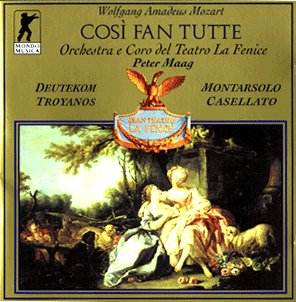In a review (elsewhere on this site) of La Bohème
in this series of live recordings from La Fenice, I welcome the
emergence of authorized, good standard, recordings, made over the past
thirty or forty years, of live performances from provincial Italian
theatres. They often have casts of wholly native speakers or, as here,
a core with that significant strength. They feature names we know well
from recordings alongside those that never achieved that accolade. On
this issue the names of the two leading ladies will be readily recognized.
Dutch-born Christina Deutekom first hit the studio as Solti’s ‘Queen
of the Night’ in the first of his Die Zauberflöte recordings
(1969 Decca) and became a Philips contracted artist singing the soprano
roles in the first of that label’s early Verdi series (I Lombardi
of 1971 and Attila the following year). This Cosí
of 1968 shows her upper voice security but also her frailty lower down
the register where her quick vibrato becomes tremulous allied to a lack
of variety of tonal depth and colour. ‘Come Scoglio’ (CD 1 tr 5), lacks
the meaning or bite that Te Kanawa’s creamy tone (for Levine on DG),
or Amanda Roocroft’s vibrantly young voice, with smooth legato and declamation,
(for Gardiner on DG Archive) bring in abundance. Her sister, Dorabella,
is sung by the American Tatiana Troyanos who is a sexy Carmen in Solti’s
1976 recording and an imperious Charlotte on Plasson’s 1979 Werther.
However, she doesn’t strike me as a natural Mozartian able to float
the legato lines and inflect them with meaning or passion. She fines
down her voice for the duets with her sister and yet seems less than
comfortable matching the bite of the gritty-toned but expressive Guglielmo.
Of the remaining singers, two bring particular pleasure.
First, the Ferrando of Renzo Casellato, a singer not known to me previously.
His is a lovely Mozart tenor voice with honeyed ‘mezza’ voce head-tone
and passagio balanced by an edge in the chest register that allows him
to give expression and bring character to the part. His ‘Un aura amorosa’
(CD1 tr 17) is a five-minute ‘tour de force’. (I forgive the intrusive,
but quickly faded, applause). Montarsolo is an excellent master of manipulation,
full of character and fruity tone with just the odd bit of roughness.
The Despina is rather thin-toned and vocally overplays her characterization
in the disguises. The conductor and continuo keep the momentum well
and the finales have vibrancy.
The recording of the overture sounds rough but sound
balances soon settle. There is some stage noise particularly in the
act 2 finale and there are times when the voices retreat; doubtless
associated with stage movement. The biggest drawback concerns the music
cuts and the sparse tracking of act 2 which comes in at only 61 minutes
as against 95 (Marriner) on Philips. Worse, it’s not just recitatives
that are cut. CD 2 tr. 6 starts with the duet ‘Il cor vi dono’ (Score
No 23) and after 11 minutes we move to tr. 7. ‘Donna mie’ (Score No
26). The recit between Ferrando and Guglielmo is included in tr. 6 but
‘Per Pieta’ (NO 25) and Ferrando’s ‘Ah, lo veggio’ (No 24) have gone!
Caveat emptor. That being said, at the right price this issue could
provide an enjoyable introduction to Cosí and which will be illuminated
by interesting essays in the booklet. This includes a synopsis in Italian
and English.
Robert J Farr
